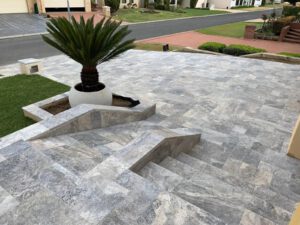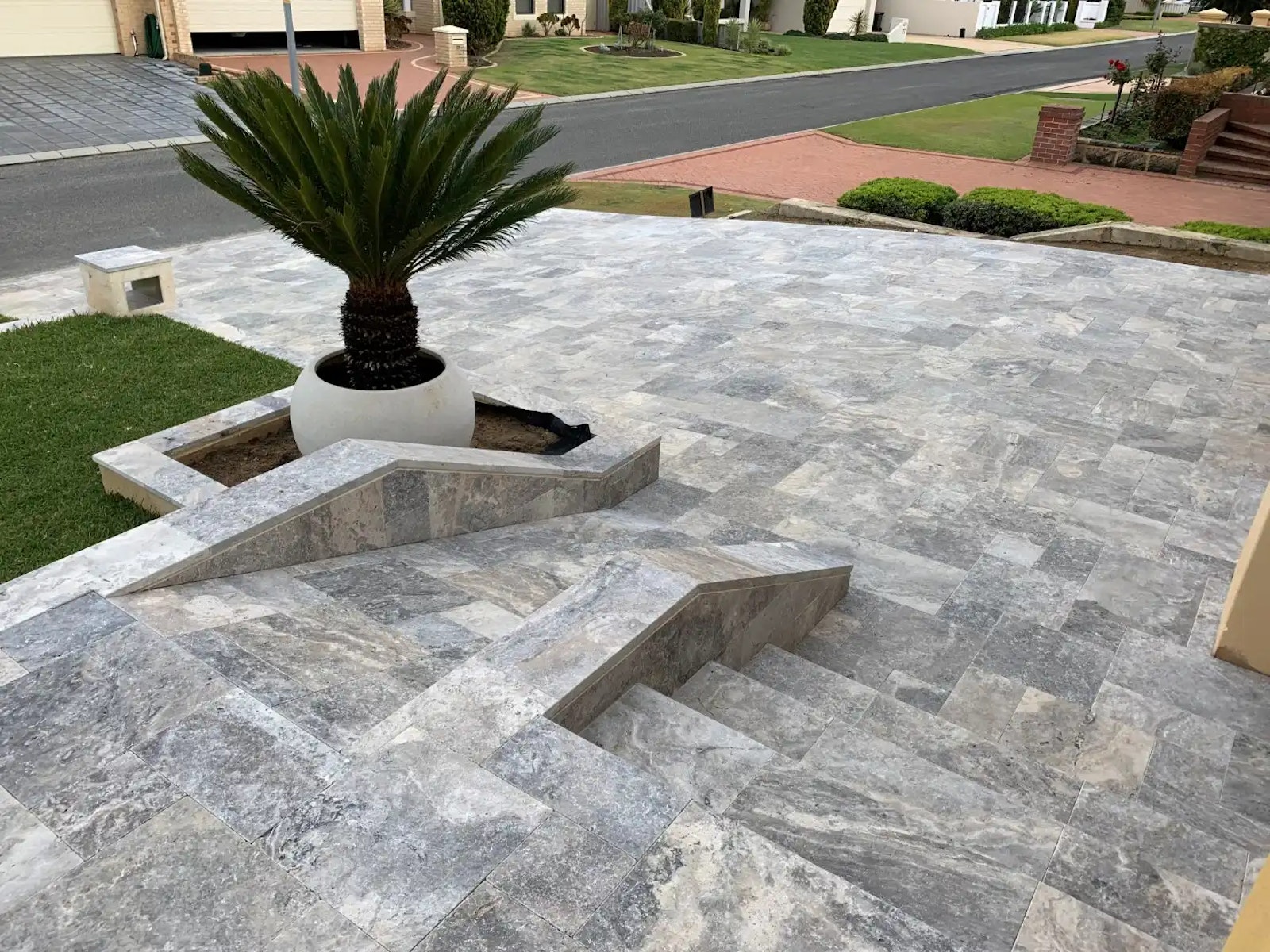SC Driveway Paving Charleston is an important investment that can enhance your home’s curb appeal and add value to your property. There are many different options for driveway paving materials to match your design preferences and lifestyle.
Traditional gravel is a budget-friendly option that is easy to maintain. Brick and cobblestone pavers provide a more rustic, natural look for a higher price tag.
The cost of a new driveway will depend on the type of material used. A reputable professional will help you choose a durable, long-lasting material that suits your budget. Some materials, like concrete, are more expensive than others. But they can last longer and provide added value to your home. Other factors, such as soil conditions and the size of your project, can also affect the cost. A larger, more complicated driveway will require a lot of labor, which in turn drives up the price.
The most common material for a driveway is asphalt. It is affordable and lasts about 15 to 20 years. However, it can crack and become damaged by extreme weather, especially in cold climates. Concrete is more expensive, but it can last twice as long. It can also be molded into unique designs and features that add to your home’s curb appeal.
A paved, gravel, or cinder block driveway can be cheaper but will have less longevity. Gravel and decomposed granite are also susceptible to erosion, especially in wet climates. A stabilizer can be applied to prevent this from occurring, but it will increase the overall cost of the project.
Before a paver driveway can be installed, the site needs to be prepared. This could include removing plants, rocks, and other debris. It may also involve leveling and integrating slopes into the design. If this is done properly, the resulting driveway will be both attractive and functional.
Some homeowners prefer the look of stone and clay pavers. They are available in a variety of shapes and colors, so you can choose a style that suits your taste. In addition, these types of materials are eco-friendly, allowing rainwater to flow into the ground and re-energize the natural water cycle. However, they are not as affordable as traditional pavers and may need more maintenance. This will be reflected in your final cost estimate. Also, some stone and clay pavers can be prone to sinking and cracking. If this is a concern, consider using interlocking blocks instead. These are more secure and resistant to damage from cars and heavy trucks.
Materials
Picking the right driveway material is one of the biggest decisions homeowners have to make. The material you choose will influence how long your driveway lasts, how much maintenance it requires, and how well it stands up to traffic and weather conditions in your area. To help narrow down your options, consider how often you’ll use the driveway and what kind of traffic it will be subject to. Other factors that may determine your driveway paving materials are budget, environmental concerns, and the overall look you want to achieve.
Concrete is a popular choice because of its durability and longevity, but it can be costly. Concrete is also prone to cracking, especially in freezing climates. A more affordable but equally durable alternative is asphalt. In fact, it’s the most recycled material. The material is derived from petroleum and is usually mixed with stone and sand. The resulting mix is then applied to the base and cured under heat.
Brick driveways are another classic option, but they can be pricey and difficult to install. They can also become slick during the winter, making them a poor choice for snowy regions. However, they do offer a distinct style that can add character to your home.
Pavers are a good option for people looking for a more natural, rustic appearance. They can be made from a variety of stones, such as granite, slate, flagstone, and bluestone. They are highly durable and easy to repair when they become dislodged or damaged.
When installing pavers, a geotextile layer should be installed to prevent the aggregate from mixing with the soil underneath. It’s a good idea to have this layer put in before you start adding the pavers, as it will also inhibit weed growth.
To prepare for a paver driveway, you need to compact the subgrade and lay a 6-inch layer of washed, crushed rock (not river gravel or other rounded rock) to serve as the base. You should then add a 1-inch layer of concrete sand and screed it, which is done by pulling a straight edge across the surface until it’s smooth and even.
Installation
If you’re planning on paving your driveway, it is best to hire a professional. This will ensure that the job is done properly and that you have a beautiful driveway for years to come. The process begins with the preparation of the soil. This will include removing any existing material and adding sand or gravel for drainage purposes. After this, the subgrade is compacted to provide a strong and stable base for the asphalt.
The next step is the application of hot-mix asphalt. This is the same kind of material that you’ll see road crews using on highways and other major roads. This material is heated to over 300 degrees Fahrenheit in order to make it workable. This process can only be completed during warmer temperatures, which makes it an ideal option for spring or summer.
Depending on the weather conditions, it may take up to three days for your new asphalt driveway to be fully installed. During this time, it’s important to avoid driving your car over the surface. This can cause it to become scuffed or uneven, and it can even damage your tires.
Once the asphalt has cooled, it is time to lay pavers over the surface. This is a process that requires skilled workers and the right equipment to do it correctly. Unless you have all of the necessary tools, it’s best to leave this type of project to the professionals.
When installing pavers on your driveway, it is important to follow the design you have chosen. It’s also a good idea to install edging, which will help keep the pavers in place. It is also a good idea to use a gravel-filled base for the pavers. This will prevent the ground from becoming too soft and shifting the pavers.
Once the pavers are in place, a final layer of mason sand should be spread over the entire surface. This will help prevent the sand from becoming too sandy and also help the joints set properly. Once the sand has been spread, you can use a mechanical tamper to push the sand into the joints.
Maintenance
When a driveway or other paved surface is installed, it’s important to maintain it properly. This can prevent damage and prolong its lifespan. Different types of paving require different maintenance solutions, but all of them benefit from routine inspections and preventive care. This helps to improve curb appeal and avoid costly repairs.
The most common problems with asphalt pavement include cracking, puddle formation, and surface depression. Moisture is the main cause of these issues, as it can penetrate through cracks and then freeze and thaw in repeated cycles, causing further damage. The best way to protect your asphalt is by having it sealed regularly. This prevents moisture from penetrating and damaging the base, reducing the risk of potholes and other deterioration.
Regular visual inspections can help you spot problems before they get out of hand. It’s also a good idea to fill cracks as soon as they appear. Small cracks can expand and become dangerous for cars and pedestrians, so it’s important to repair them promptly.
Weeds are another issue that needs to be dealt with as soon as they appear on a paved surface. They may grow roots and overtake the paved area, making it hard to drive on or walk on. This is especially true for weeds that grow through cracks. Using a weed killer can keep them from growing and spreading.
A paved driveway can last a long time with proper maintenance, but the materials can still be damaged by environmental factors and heavy use. Routine maintenance includes resealing, patching, sweeping, and cleaning. In addition, oil and gas spills should be cleaned up as soon as possible. This will prevent the buildup of chemical stains that can ruin the surface.
Concrete and asphalt driveways should be resealed every two to three years to prevent water from penetrating and damaging the surface. Sealing also keeps the color of the asphalt from fading and maintains the value of your home. It’s important to choose a sealant that is specifically designed for this material. Other generic products can actually contribute to the deterioration of pavers. It’s also important to ensure that the driveway has adequate drainage. This can be done by grading the slope of the driveway away from the house, which will prevent water from pooling at the edges and causing low spots.

